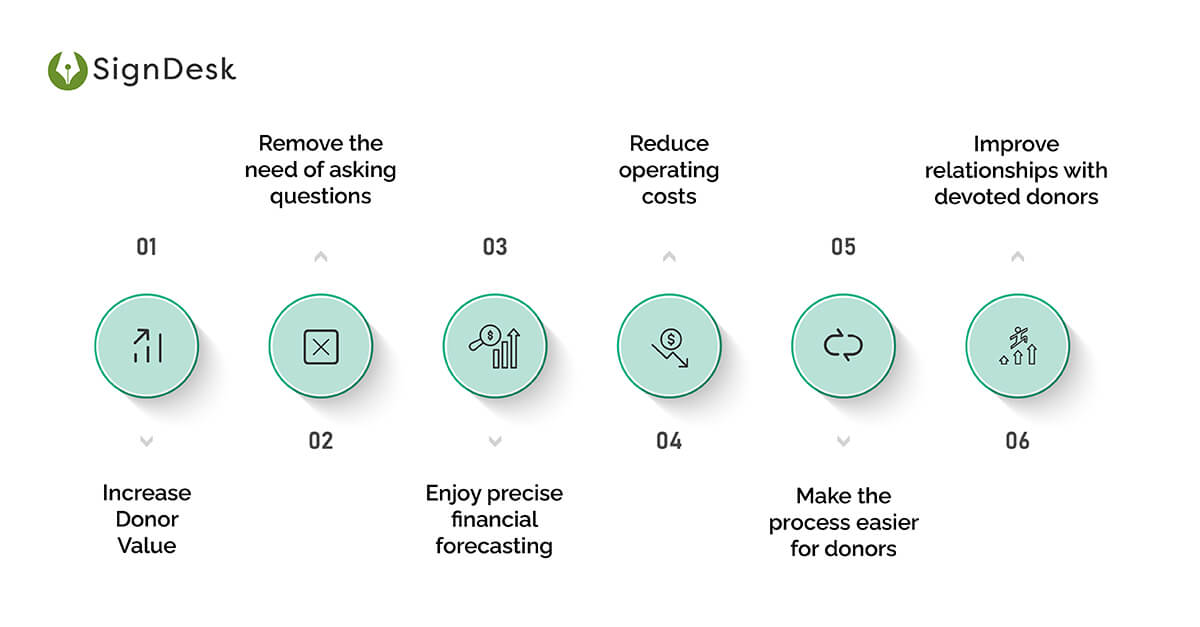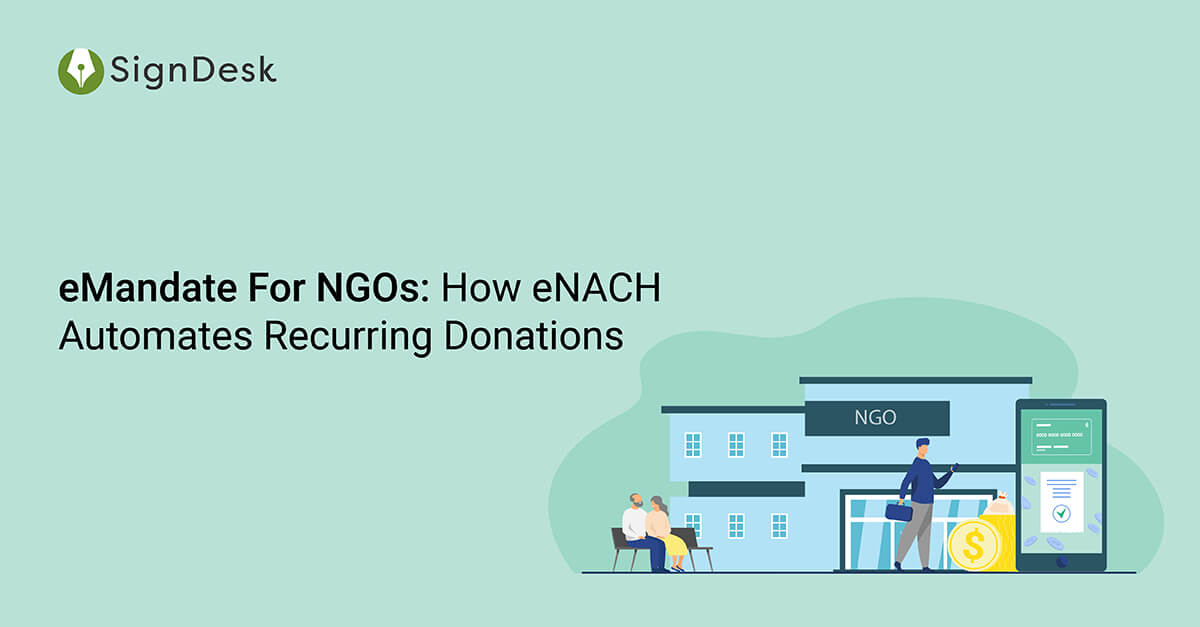Digital Donations For NGOs – Overview
The NGOs or the non-governmental organizations, that collect money for humanitarian and social these days require a lot of money mainly due to COVID-19 and other disasters that affect not only mankind but also animals and the environment as a whole.
People are contributing increasingly more to the missions that resonate with them as public support for charities and other cause-based organizations continue to rise.
Due to shifting financial and digital trends, the modern donor has starkly different spending tendencies than the donor segment NGOs have traditionally catered to. Today, the majority of charity donations are made online or through debit or credit cards, as opposed to cash or cheque-based donations in the past.
Digital payments have also made organizations more efficient in managing and accounting for donations. eMandates, in particular, is playing a massive role in helping NGOs and NPOs build effective recurring donation systems which rely on recurring payments from donors.
What is a Recurring Payment?
Recurring payments, sometimes known as AutoPay, indicate that a customer has authorized a retailer or merchant to debit the requisite payments for goods bought or services availed from their bank account or their credit card on a periodic basis (usually per month).
The merchant must obtain the consumer’s permission only once at the beginning, following which the customer must authenticate every subsequent debit using Additional Factor Authentication (AFA).
Late fees are never an issue because the merchant deducts the amount on the due date. The automatic payments will continue until the consumer withdraws his or her consent.
Recurring payments are classified into two types:
- Fixed Payments:
These are recurring payment regimes wherein the customer is charged the same amount for every debit. Fixed payments are among the most frequent types of recurring payments and are common for subscriptions.
- Variable Payments:
The amount charged with variable or irregular recurring payments is subject to change based on the customers’ usage of the product or service. Variable payments are used when the payment charged depends on the usage of the service being paid for or the amount of consumption; utility billing is an instance when variable payments are employed.
eNACH-based Recurring Payments for Easy Donations
Non-profit organizations benefit greatly from monthly giving programs. When properly integrated, the incentives far outweigh those of other gifting models such as one-time donations or annual pledges.
Online recurring donations are made on a regular basis, usually monthly using eNACH mandate process as a payments solution. Instead of making a one-time donation to a charity or foundation, an individual commits to donating a set amount on a regular basis.

eMandate systems based on subscriptions for NGO donations enable the organization to:
- Increase Donor Value
Repeat donations are often difficult to obtain from contributors, but those who commit to monthly donations usually do so for the long haul on a recurring payment platform. According to the Non-Profit Recurring Giving Benchmark Study, monthly donors have a retention rate of 90%, compared to 46% on average, 23% for first-time donors, and 60% for repeat donors for online fundraising.
- Remove the need to ask again.
Some donors are irritated when non-profits repeatedly contact them for repeat donations. When donors sign up for recurring donation programs, they make payments on a regular basis with no additional effort on the part of the organization.
- Enjoy precise financial forecasting.
Forecasting future recurring donations is difficult, if not impossible, with traditional models (one-time gifts or pledge-based). Money pledged but never received can derail an organization’s plans. Because these donors are often the most loyal, consistent, and have the highest retention rates, recurring donation systems make it simple to account for future funds.
- Reduce operating costs.
Recruiting new donors requires more resources and expenses than engaging with existing donors. Giving donors the option to make recurring monthly donations increases donor retention. Lower operating costs result from increased donor retention! With a monthly giving programme in place, the recipients can relieve the stress and effort of constantly soliciting sustaining donors.
- Make the process easier for donors.
Options to encourage recurring donations are beneficial to both NPOs and donors. The lives of nearly all donors already involve periodic monthly payments for a variety of services such as utilities, telecommunications, subscriptions, and more. Therefore, automated donations fit well into this milieu.
It is convenient and affordable for donors to support important organizations/causes with a monthly donations. Online recurring donations using eMandates are also particularly appealing to older millennials, an increasingly important donor segment for NGOs and NPOs.
- Improve relationships with devoted donors.
Most NGOs know that sending out frequent mailers causes decreased engagement from donors; however, the same donors also enjoy the feeling of charity. Therefore, NGOs need to find the right balance between email strategies and business models to keep the donations flowing. In this regard, monthly donations appear to be the optimum frequency to elicit recurring donations, and eMandates play a key role in helping set up these recurring donations.
How eMandate Enables Recurring Donations For NGOs
A mandate is a standing instruction that an individual gives to an issuing bank to allow them to automatically debit a specific amount from his or her bank account.
The term “e-mandate“ refers to the electronic form of mandates used by businesses to easily manage various types of recurring payments. The e-mandate process eliminates the hassles of sending reminders and requesting penalty charges from consumers, and it eventually proves to be a win-win situation for both parties.
While businesses have long collected recurring payments such as SIPs, insurance premiums, and so on, the process was previously authorized through a physical form that the end-user filled out and signed. E-mandate and e-NACH streamlined the entire process.
How To Set Up eMandates For Recurring Donations
Any NGO or NPO can set up an eMandate-based recurring donations collection system with ease. To implement eNACH mandate process, organizations simply need to integrate with a provider of eMandate solutions.
Once the eMandate has been set up with either API, Aadhaar or manual mandates, the organization can ask donors to set up mandates according to their donation amounts and payments will be collected regularly and automatically.
Here’s how the eMandate process works.
- The donor registers a mandate with their destination bank (i.e, the bank in which they hold an account)
- Once the mandate is authenticated by the donor, the mandate details are sent via SignDesk to NPCI, which shares these details with the NGO’s bank and an intermediary sponsor bank
- Next, a debit sheet with the relevant payment details is generated by SignDesk and sent to the destination bank via NPCI
- After the debit sheet is received, the donor’s bank sends the debited amount to NPCI from where it’s transferred to the sponsor bank and then SignDesk’s nodal account.
- Finally, the donation is credited to the NGO’s bank account and this process is repeated periodically.
Mandate authentication occurs in real-time if NGOs choose Aadhaar eMandates, and the entire debit process is completed within 1-2 working days.
As more people recognise the importance of mutual assistance, various NGOs are now asking for donations to support various social initiatives such as sponsoring a child, sending groceries to different households every month, and so on.
Because there is a chance that a donor will miss the deadline for making a periodic donation, many NGOs have implemented e-mandates. It streamlines the process of receiving donations on a regular basis, allowing them to continue to benefit the needy.
SignDesk: E-NACH Mandate Payments Automation Platform
SignDesk provides an NPCI-compliant eNACH eMandate solution to automate recurring payments effortlessly. By authorizing the customer’s bank to debit the account on a regular basis, our solution allows for the management of periodic payments. SignDesk’s e-Mandate solution also allows clients to quickly confirm e-Mandates with Aadhaar eSign, NetBanking, or debit/credit card credentials, and set up recurring auto-debit transactions for your business.
Several major banks and FIs use SignDesk’s eMandate and eSign products to reduce expenses by 60-85 percent and turnaround time by more than 50 percent.
Customers can use Aadhaar-based authentication to digitally sign documents using eSign workflows, and our NPCI-compliant E-Mandate solution allows for quick and smooth payment collection for bills, subscriptions, donations and loan EMI payments.
